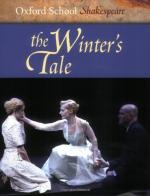|
This section contains 3,774 words (approx. 13 pages at 300 words per page) |

|
SOURCE: Abrams, Richard H. “Leontes's Enemy: Madness in The Winter's Tale.” In Aspects of Fantasy: Selected Essays from the Second International Conference on the Fantastic in Literature and Film, edited by William Coyle, pp. 155-62. Westport, Conn.: Greenwood Press, 1986.
In the following essay, Abrams examines the source of Leontes's jealousy, noting that “[under the spell of jealousy, Leontes is changed. His good angel, reason, abandons him, and the tempter, imagination, does his thinking for him.”]
Just before their duel, Hamlet apologizes to Laertes for his wild behavior at Ophelia's grave by placing the blame on an “enemy” that took over when Hamlet “from himself [was] ta'en away”(V.ii.234).1 This “enemy” in Hamlet's expansion of the figure becomes virtually a possessing demon, like the “unclean spirits” (cacodaemones) said to afflict the mentally ill in a tradition holding from Biblical times to the Middle Ages. In the Renaissance, this...
|
This section contains 3,774 words (approx. 13 pages at 300 words per page) |

|


